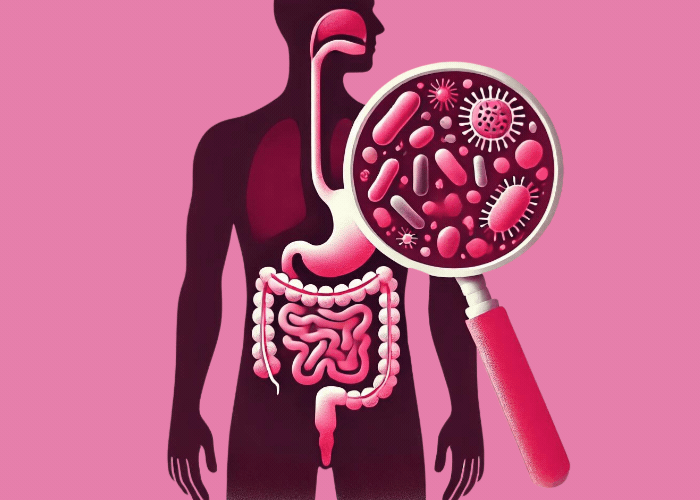The benefit of select probiotic bacterial strains in regard to childhood allergies has been known for years and has also been confirmed in numerous scientific studies (cf. i.a. Niers 2009, Kim 2015). The mechanism of action is based on the fact that these bacteria support the balanced maturation of important immune cells (TH1 and TH2 Cells).
Recent research findings (Soderborg 2016) now prove that the transmission of obesity and diabetes from mother to child happens via SCFAs (short chain fatty acids): These are created when specific gut bacteria ferment indigestible fibre. Subsequently, the SCFAs (mainly acetate, propionate, and butyrate – normally present at a ratio of 3:1:1) are absorbed by our body where they mainly regulate the immune system and modify numerous metabolic processes such as the endogenous fatty acid and glucose production (lipogenesis and gluconeogenesis). SCFAs are also essential for energy production and the regulation of cholesterol synthesis in the liver. Furthermore, SCFAs determine how much we eat by regulating the secretion of appetite-suppressing hormones. During pregnancy, the gut flora (= microbiota) of the mother is altered – and changes in bacterial composition also lead to an altered ratio of produced SCFAs. A recent study (Soderborg 2016) now shows that a transmission of obesity and diabetes from mother to child occurs via SCFAs and so triggers a vicious cycle.
Mothers share bacteria with their baby
Mothers share their bacteria (and especially the bacteria’s metabolic products like SCFAs) with the foetus in the uterus, during the birth process (vaginal and gut flora during a natural birth; skin flora during a C-section birth), and even nursing allows for the transmission of maternal bacteria to the child (“entero-mammary pathway”). In the first days after birth, breast milk is not necessarily only for the nourishment of the child. It is rather a means to manipulating the bacterial colonisation of the gut. Breast milk contains more than 200 different sugar molecules. At first the new-born doesn’t have the capacity to digest and metabolise these sugars; bacteria however, are experts at digesting them (Autran 2016). This means that these aforementioned sugars enable and encourage specific bacteria to colonise the new-born’s gut, which was germ-free up to that point. Furthermore, the composition of the breast milk changes during the course of the breastfeeding period. This also means ongoing changes occur in the bacterial colonisation of the infant’s gut. Specific sugar molecules, so-called oligosaccharides, can bind potentially pathogenic germs and so ensure that pathogens are selectively eliminated from the baby’s gut.

It has been known for some time that breast milk supports the development of the infantile immune system. Straight after birth it contains an especially high proportion of biologically active proteins and so acts as a kind of “loan immunity” for the new-born. This goes on for roughly a month, at which point the child’s own immune system can take over the task of defending the body from pathogens. At this point the number of maternal antibodies in the breast milk decreases by roughly 90 percent. Moreover, the diversity of sugar molecules is reduced significantly. Conversely, the fat content in the breast milk increases and so encourages the baby’s growth.
Setting the course for health
It is therefore essential for the development of a child that its mother has a balanced gut flora during pregnancy and whilst breastfeeding. By eating a balanced, fibre-rich diet or by taking select probiotics, the mother can set the course for a healthy next generation. And even if the mother’s useful bacteria can’t be sufficiently transmitted to the infant gut (e.g. babies born by C-section or babies which are only bottle-fed formula because the mother cannot or doesn’t want to breast feed) special probiotics with human germ strains, created specifically for infant requirements can steer the new-born’s immune system in the right direction – because a child’s immune system doesn’t get a second chance!



























